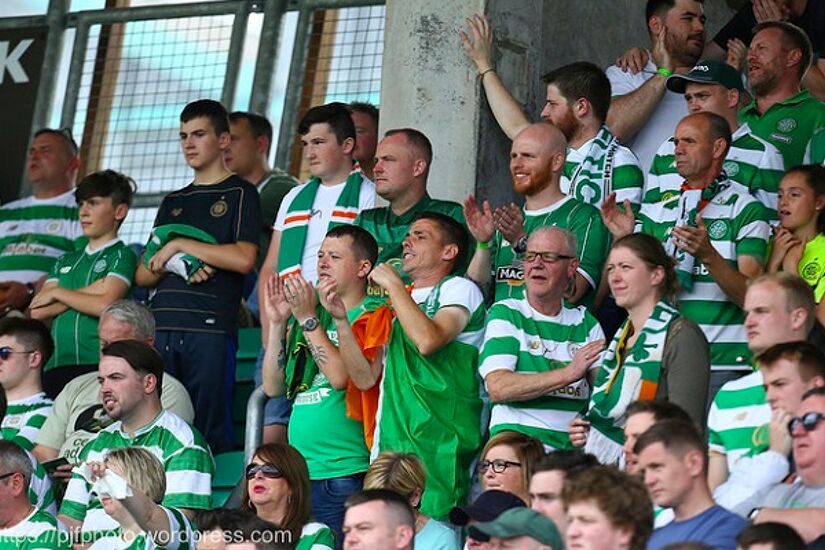Dave Donnelly: The financial benefit of summer friendlies is obvious - the costs are more difficult to quantify

Credit: Peter Fitzpatrick (ETPhotos)
The merits and demerits of mid-season friendlies for League of Ireland clubs against moneyed British sides has been tirelessly debated in recent years.
It's long been a point of contention, even before Dermot Keely's infamous '42,000 morons' comment after Shamrock Rovers' 4-0 defeat to Liverpool at the Aviva Stadium in 2014.
The margin of the defeat to Scottish champions Celtic in Tallaght on Saturday – a 9-0 defeat that made for extremely uncomfortable viewing – has brought the issue back into focus.
Hoops boss Stephen Bradley chose to rest all of his first-team players following Thursday's Europa League win over Stjarnan, with the next round against Mladá Boleslav on the horizon this week.
Bradley had been straightforward in the press the week beforehand that it would be a purely reserve team playing, and anybody who follows the league could have foreseen the same.
Just four of the starting line-up were aged over 20 – two of them trialists – in a team with an average age of just 21.5, and that average only decreased as Bradley rang the changes in the second half.
However the sight of a top League of Ireland side on the end of such a hammering in a game broadcast live around the world raises a significant problem.
Nobody could quibble with Bradley's selection, sandwiched between two pivotal games for Rovers' season, but the optics are undeniably poor for a league that lacks credibility among an overwhelming proportion of the Irish public.
The club initially advertised the friendly engagement with Celtic as 'Shamrock Rovers' but have belatedly changed next Friday's meeting with Premier League outfit Burnley to a 'Shamrock Rovers XI.'
It could be argued that it was a misleading sell to Celtic fans expecting to see their side face a full-strength side, but chances are those fans would have come to see their heroes regardless.
The bigger issue is for a league that, through the efforts of Rovers in 2011 and Dundalk last year in qualifying for the Europa League, has slowly built up its reputation as a league of some quality.
While summer friendlies against big-name sides are primarily money-making exercises – Rovers pocketed a significant sum from the afternoon's work – these games have, in the past, seen new fans converted to their local clubs.
Robbie Keane brought LA Galaxy to his hometown at the beginning of last season, narrowly losing 1-0, and, while difficult to quantify, it certainly appeared to be a worthwhile exercise for both sides.
Indeed, the archetypal American 'let's go' chants can still be heard from some of the younger cohorts of Hoops support at Tallaght Stadium today.
It's difficult to see what, if anything, young Celtic fans could have taken from Saturday's friendly except the impression that Rovers are simply unable to compete on the same level.
This can be seen in the way the game was reported in the Scottish press over the weekend as the overarching impression seemed to be that the Celts had simply overwhelmed their opponents.
'Celtic produced a dominant display as they wiped the floor with Shamrock Rovers,' parped the Scottish Daily Record on Sunday.
The Scottish Daily Mirror described it as 'a rout as Celtic have outclassed their League of Ireland opponents.'
The Sunday Herald noted that Celtic 'put the sorry hosts to the sword' in a 'worthwhile exercise' ahead of Friday's Champions League tie against Linfield at Windsor Park.
Celtic boss Brendan Rodgers explained that the Glasgow club had requested the tie with Rovers as a means of getting up to speed ahead of their first competitive game of the season.
That was reflected in his team selection, which is likely to be the same 11 players who tog out on Friday, barring perhaps captain Scott Brown who limped off with a first-half injury.
Rodgers must have been aware that his opposite number – or any other League of Ireland side they could have met – would be unable to field anything approaching a full-strength team.
That realisation doesn't seem to have extended as far as the Scottish media, however, whose eight or so representatives passed little remark on the home side.
One Scottish journalist seemed aware of the context, asking me who Rovers' opponents on Thursday were, but none of the rest appeared to have any interest in the opposition.
It's completely understandable as they were there to look at Celtic as they gear up for their season's bow, but the lack of appreciation of who they were up against was galling.
And so the perception outside of the small circle of League of Ireland journalists and supporters seems to be that Celtic just steamrolled the fourth-best team in the League of Ireland.
The Glasgow Evening Times later reported that winger James Forrest 'tormented hapless League of Ireland side Shamrock Rovers in a nine-goal pre-season thumping.'
The Daily Record said Forrest was 'outstanding in Saturday's 9-0 demolition of Shamrock Rovers' and the Scottish Sun that he 'terrorised Shamrock Rovers.'
None saw fit to mention – or, perhaps, none was aware – that Forrest was up against trialist Dean Carpenter, who last season plied his trade with Collinstown in the sixth tier of amateur football
Collinstown are in an artificially low position having been placed in the Major 1 after defecting from AUL, and Carpenter shook off an uncertain start to perform quite well.
Nevertheless, he was playing with his teammates for the first time – left centre-back Tim Linthorst was also on trial – and had little protection as Rovers' midfield four were overrun out wide.
18-year-old right-back Cian Collins, playing just his second senior game, saw Celtic's international full-back Kieran Tierney create two goals down his side.
In the centre of defence, 18-year-old Sam Bone partnered Linthorst, while in midfield 17-year-old Aaron Bolger was left with an unenviable task against internationals Brown and Stuart Armstrong.
What's disappointing is that all of this context has been lost in the coverage of the game that seemed to focus almost exclusively on how easily Celtic dismantled 'sorry' Shamrock Rovers.
And it was a disconcerting episode to watch for that many of us who love the League of Ireland and Irish football and want to see it succeed and to be seen to succeed.
To watch a team of promising young Irish players put to the sword by millionaire professionals while their countrymen sing rebel songs in support of the away side was a surreal experience.
Ultimately, it probably couldn't have been helped as ignorance is a difficult thing to dispel, and the lack of interest from most attendees in a callow Rovers side will always trump a reasoned analysis.
Rovers have made their money – and will do so again when Burnley and their five Ireland internationals roll into town – but the costs are, by contrast, much more difficult to quantify.

